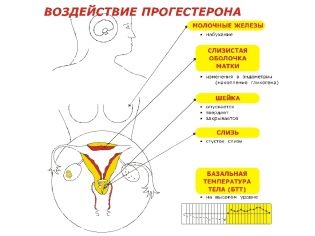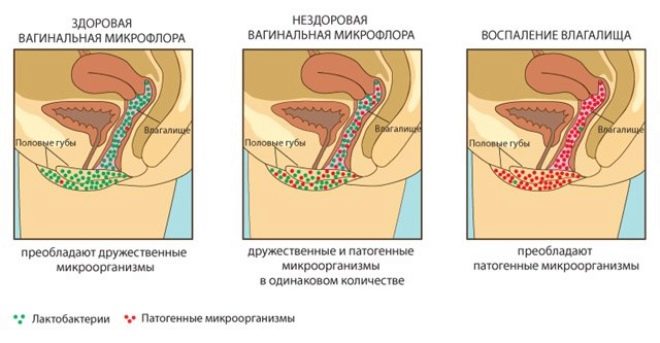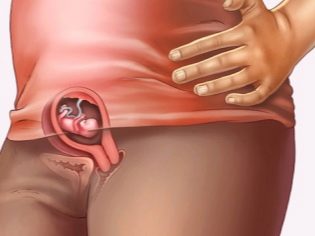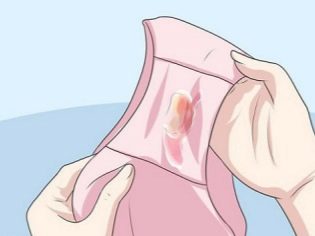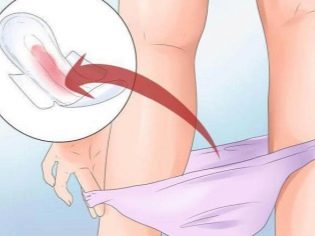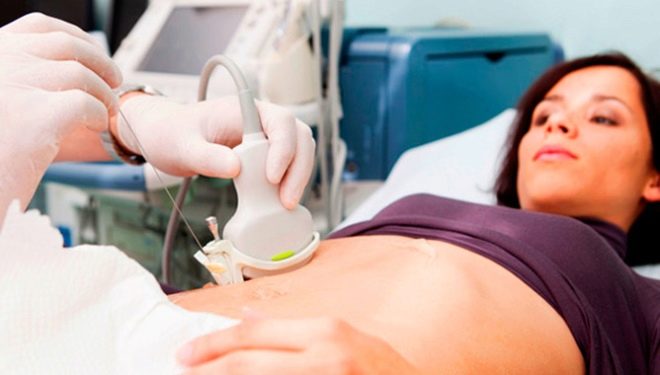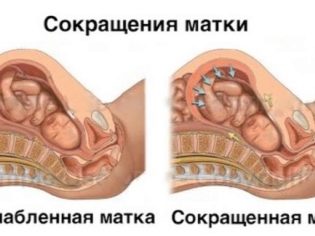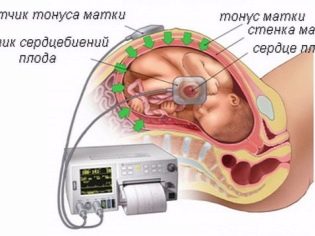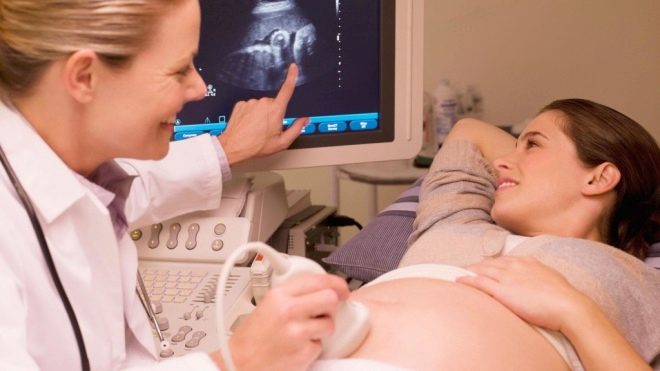8 week of pregnancy: discharge and pain in the lower abdomen
Each period of carrying a baby is truly unique. In the female body in the early period of pregnancy, very specific changes occur.
Timing
The age of the baby, who is in the womb, experts determine with the help of obstetric months and weeks. This calculation is somewhat different from the usual calendar method from the date of fertilization.
The whole pregnancy lasts 280 days. There are differences between obstetric and calendar age. 8 obstetric week is equivalent to 6 weeks since the confluence of the male and female germ cells.
Tummy size
At this stage of pregnancy, the female proportions of the body do not change much. The size of the abdomen increases slightly. From the side to determine whether a woman is pregnant or not is impossible.
At 8 weeks of pregnancy, the expectant mother looks quite normal. Big belly can not be called: an increase in the circumference of the female tummy will occur a little later, when the baby grows larger. However, miniature and thin women can see a slight increase in the lower abdomen.
Most women who have already become mothers note that they did not notice significant changes in the size of their abdomen at this stage of pregnancy.
At this stage of pregnancy, the size of the uterus is still relatively small. It resembles a large grapefruit.
Features vaginal discharge
This stage of carrying a child in a pregnant woman is accompanied by the appearance of biological fluid from the vagina, which is promoted by both physiological and pathological reasons.
The appearance of light discharge or clear mucus from the vagina, in appearance resembling a white liquid, in the absence of any unpleasant odor is a variant of the norm for a given gestational age.
The appearance of this discharge from the vagina has a very physiological reason. Such specific changes are triggered by an important pregnancy hormone - progesterone, which acts on the epithelial cells lining the vagina, causing glycogen to accumulate in them.
In turn, it provokes active growth of beneficial microbes that normally live in the intimate area. These microorganisms are necessary to maintain optimal microflora and pH.
If glycogen is formed enough, it protects the female body from various infections. Reducing the concentration of progesterone in the blood during pregnancy is dangerous development of many pathologies, including the weakening of local immunity in the vagina. Reducing such protection contributes to the fact that a pregnant woman can develop adverse symptoms of candidiasis (thrush).
This pathology appears due to the active growth and reproduction of Candida mushrooms. They develop in the intimate area rather quickly under conditions favorable to their growth.
An important clinical sign of this disease is the appearance of light discharge from the vagina, resembling cottage cheese flakes in appearance. The color of such secretions, as a rule, white and beige.When a secondary bacterial flora is attached, a woman may have yellow discharge.
Accompanied candidiasis is also not less uncomfortable symptom - the appearance of itching in the intimate area, the degree of which may be different.
As soon as the future mommy had these adverse symptoms, she should immediately seek medical help. Many women decide to treat candidiasis on their own, but doctors do not recommend this.
During pregnancy, it is very important to correctly and carefully select therapeutic therapy. Many of the drugs have an adverse effect on a small embryo. Only a doctor will be able to choose a truly adequate, effective and safe treatment.
At this period of carrying a baby in a pregnant woman, a special education appears - mucus plug. It protects the internal cavity of the uterus from penetrating into it dangerous infections, as well as from the influence of external factors. The mucus plug will be in the genital tract before the onset of labor.
The color of secretions characteristic of this gestational age is the most diverse.
The appearance of any light brown or dark brown discharge from the genital tract is an important reason to visit your doctor. Especially you can not hesitate with a consultation, if they are accompanied by increased pain in the lower abdomen, as well as deterioration of health.
Bloody discharge is a clinical sign that should not be ignored. If a pregnant woman noticed pink or red blood spots on her underwear after having sex or after performing a transvaginal ultrasound, she should not panic. Such symptoms often develop after mechanical effects on the genital tract. As a rule, they completely disappear by the end of the first day from the moment of occurrence.
In most cases, after such mechanical effects, bleeding appears without pain in the abdomen.
It so happens that a woman notices on her lingerie a heavy scarlet discharge that occurs without any apparent reason. Their appearance can be a very unfavorable sign.
In some cases, the occurrence of pale or bright red discharge may be a manifestation of a spontaneous miscarriage that has begun. In this case, it is very important to provide timely medical care.
Doctors say that at 7-8 week of pregnancy, an ectopic pregnancy is very often manifested. It is accompanied, as a rule, by the development of bleeding or even bleeding from the genital tract. The general condition of the woman is aggravated by the strong pain syndrome in the lower abdomen.
Ectopic pregnancy is a pathological condition in which the embryo develops not in the uterus, but in the appendages. Pipe pregnancy is not provided by nature. The uterine appendix does not have the same structure as itself. In medical practice, there are cases when a woman does not even suspect that he has such a pathological condition.
In medical practice, there are cases when a woman does not even suspect that he has such a pathological condition.
At the same time, she “deducts” the delay of menstruation to severe stresses at work or other conditions. In the end, she develops bleeding from the genital tract, there is a strong pain in the abdomen. In a rather serious condition, she is hospitalized in a hospital, where the presence of ectopic pregnancy is detected.
When bleeding from the genital tract occurs, the doctor must conduct a comprehensive clinical examination, during which the doctor determines not only the severity of the mother’s condition, but also her baby’s. If the situation requires it, the doctor can also refer her patient to an unscheduled ultrasound.
Sensations in the stomach
At this time of pregnancy, the future mom can feel the discomfort associated with the active growth of the uterus, as well as under the influence of a changing female hormonal background.
Become more dense and more elastic walls of the uterus. This feature is necessary in order to protect a small embryo from the effects of adverse environmental factors.
Increasing in size uterus leads to the fact that the future mommy begin to appear different sensations. Many women have tingling in the lower abdomen.
Usually, the severity of this symptom is moderate and does not bring discomfort to the woman. Colitis in the lower abdomen in pregnant women also after eating fatty and fried foods, the presence of other errors in nutrition.
If a woman pulls the lower abdomen all the time and the pain syndrome only progresses, then she should definitely consult her doctor. Soreness of the lower abdomen at this time may be quite a physiological symptom caused by the growing uterus. However, if the future mother is worried about this, then it is better for her to “dispel” her doubts with a specialist.
Increasing the size of the abdomen leads to the fact that the pregnant woman begins to choose more comfortable postures for rest and sleep. Many women at this time out of habit accidentally go to sleep on the stomach, and then fear the consequences, but you should not worry: she cannot do much harm to a child. As the pregnancy develops and the abdominal circumference increases, the expectant mother will not physiologically sleep on her stomach, choosing more comfortable postures.
One of the important criteria assessed is uterine tone. It shows how adequately the walls of the uterus function.
Normally, the muscular layer of this genital organ - myometrium - should be capable of contractions, as this is due to its structure. Myometrium is formed by smooth muscle fibers located in different directions and capable of increasing its size under the influence of a number of hormones. These fibers can be reduced, which contributes to an increase in the thickness of the uterine walls.
The uterine tone allows doctors to assess the ability of this reproductive organ to reduce. If it increases, this condition is called hypertonus. Its appearance leads to an increased risk of spontaneous abortion. With hypertonicity of the uterus, an expectant mother undergoes intensive medical observation.
Too intense uterus can lead to adverse symptoms in a woman. So, the future mother can feel that she has a stomach ache as during menstruation. Usually pain increases after stress or exercise. The appearance of such a symptom is a reason to consult with your doctor.
Another possible symptom of uterine hypertonus may be a "hard" belly. Pain syndrome can also spread to the lumbar region and the coccyx.
Doctors recommend taking a more comfortable position when pain occurs: muscle relaxation contributes to pain relief, and even and deep breathing will also help to improve your well-being.
The most optimal clinical condition is normal tonus, which is characterized by normal intrauterine pressure. This contributes to the optimal development of the baby in the womb.
For uterine tone, doctors conduct dynamic monitoring throughout pregnancy. This allows them to timely detect dangerous pathologies for the fetus in the early stages of their occurrence.
Important information about the 8th week of pregnancy, see the video below.




